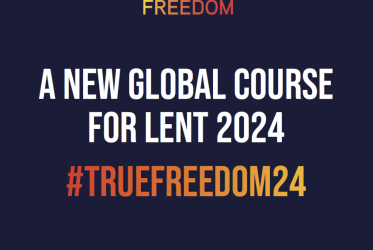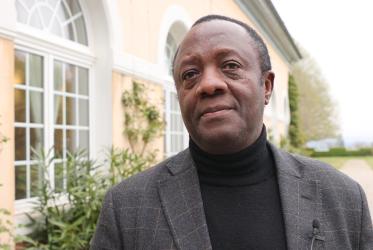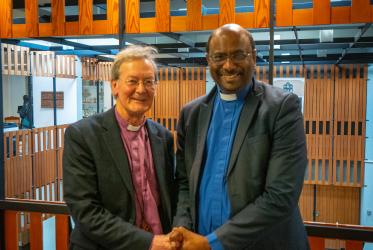World Council of Churches, World Alliance of Reformed Churches & Council for World Mission
Concept paper for the
International Ecumenical Conference in Commemoration of the 200th Anniversary of the Abolition of the British Trans-Atlantic Slave Trade
Runaway Bay, Jamaica, December 10 - 15, 2007
For its very logic, purpose, manner and continuing impact, the Trans-Atlantic slave trade, also often referred to as an "African holocaust", would perhaps remain as one of the most shameful wrongs in human history. For over four and half centuries, millions of Africans were transported to serve the economic interests of European colonial powers in their so-called "New World". It was not only a case of the combination of racial arrogance and greed resulting in a massive abuse, exodus and exploitation of human beings and natural resources, but one that stands as an unparalleled testimony to the human capacity to be diabolical in the pursuit of wealth and power. Its long-lasting legacies include the continued poverty, exploitation, oppression of Africa, the endless struggle for dignity and survival of the African Diaspora in the Americas where African identity has been made an object of racial discrimination, besides the centuries-old psychological trauma of the slave trade which continues to haunt generation after generation.
The silence, reluctance and tardiness of the former colonial powers to own responsibility for this crime against humanity are indeed shocking! It was only recently that the successive powers admitted that it was a wrong: yet they stopped short of apologising for fear of reparations claims. Such calculated expressions of remorse and regret did very little to undo the damage, let alone to support initiatives to outlaw today's forms of slavery. The demand for reparations has always been intellectualised, complicated, trivialised with rhetoric and empty promise, and addressing it avoided in any concrete way. Even as the world marks the 200th anniversary of the formal abolition of the British Trans-Atlantic slave trade, the former colonial powers have fallen miserably short of repenting in such a way that would heal the wounds of the offended and right the wrongs of history.
One of the major allies of this sordid episode of human abuse was the theology of the church and its role in building and sustaining European empires and benefiting financially from their conquests. The church's civilising mission was inextricably incorporated into these conquests. By lending legitimacy to the imperial plans of expansion and exploitation, the church developed theologies that propagated distorted anthropologies and glorified the ruthless exercise of power and exploitation of people and the earth. The commemoration of the 200th anniversary of abolition needs to be, perhaps, a time of repentance for the church and of saying together kyrie eleison. However, what is often forgotten but certainly needs to be recognised is the church that existed as a threatened and enslaved community in the dungeons and ports, and in the ranches and plantations, bearing witness to the prophetic hope of liberation through resistance and revolt. In other words, the abolition of the slave trade was not an act of benevolence of the colonial powers but of the resistance of those who were enslaved and of the assertion of the spirit of life of those whose lives were abused. So, the commemoration includes remembering those heroes, their determination, and the spirituality and hope that enabled them to seek new identities as new people in North America, Central America, South America and the Caribbean, albeit impoverished and disempowered, and as those constantly in the struggle for voice, for dignity and justice.
It must also be emphasised that commemorating the abolition of slave trade is not, under any pretext, an assertion of the absence of slavery in today's world. It exists in many obvious and hidden ways and forms and in many places. Human trafficking for sex and for labour, bonded labour, child labour, sweat shops, families and communities in endless cycles of poverty and depravation, economic boycotts of communities that resist oppression and exploitation, incarceration of young people, racial discrimination, etc., have become common place in the world today. In fact the occasion of the 200th anniversary has inspired a number of initiatives in many parts of the world to address the modern forms of slavery that are beginning to be seen as inevitable and normal under the present global empire of the neo liberal economic powers.
Even as the 21st century globalised world boasts of tremendous human capacities for creativity, innovation and growth, sadly it also allows for shameful practices such as human slavery. These forms of slavery operate with the same logic, purpose and manner as the infamous Trans-Atlantic slave trade, on the assumption that under the present empire some human beings are inferior and hence can be abused, exploited and expended. So much so that the benefits of the present economic globalisation seem to favour some in certain geo-political and social locations, whether in the north or in the south. Both winners and losers have names and faces. Africa was exploited both in its human resources and ecological gifts, resulting in its impoverishment. Africa continues to suffer today under the current world economic order. The 2005 Hurricane Katrina disaster in the USA revealed the gross injustice against African Americans who live in poverty in the most wealthy and powerful nation in the world, where they are treated as "disposables" by the current regime. In India, the much-loathed booming economy has very little hope to offer to the millions of socially underprivileged caste communities, the Dalits and the indigenous peoples. This exposes the fact that the empire of the neo-liberal economic powers, as it consolidates itself by institutionalising injustice, cannot ensure justice or restore the disempowered. The sanctity and survival of the human person and the integrity of the complex web of life are again in deep crisis. This unabated commodification of the human person and earth resources by the modern consumerist and industrialised society is an urgent ethical and existential challenge that the world cannot afford to ignore.
Unfortunately, again, religion, religious institutions and their theologies seem to be actively at the service of these global economic and political powers, lending legitimacy for their ruthless exploitation and destruction by offering language and expression to justify obscene prosperity and absolute power amidst massive human misery and suffering. The dangerous convergence of imperialism and Christianity in support of the U.S. led "war on terror" and its pursuit of economic and military might needs to be urgently addressed. Prosperity theology and acceptance of the status quo contribute to increasing poverty and turns a blind eye to injustice. Here lies yet again another challenge, yet another moment in history for churches to make a clear choice: to stand with the hegemonic powers or the disempowered. At this historic moment, when history seems to repeat itself, when the world seems to allow the same crime to be committed again, but with much more sophisticated justifications, what is the distinct response of the churches and the ecumenical community? What would be the contribution of the churches to the ongoing discourse and initiatives in response to the legacy of slave trade and the continuing bondage and abuse of human beings in the 21st century?
It is in response to some of these questions, the World Council of Churches, the World Alliance of Reformed Churches and the Council for World Mission brought together a small group of persons representing the churches and people's initiatives in the Caribbean, North America, South America and Africa in Geneva on 16 to17 March 2007, to advise on possible programmatic directions that this collective effort could attempt. One of the suggestions made by this group was to organise an international conference in December 2007 to articulate the views of the global ecumenical community on some of the major moral questions that the legacy of slave trade as well as the reality of slavery today pose. It is hoped that it would be a relevant contribution on the part of the global ecumenical community, particularly in view of the sharp questions that humanity is faced with at this moment in time and history. Hence, this conference is being planned to bring together about 60 theologians, church leaders, social scientists and social/cultural activists from many parts of the world, especially from Africa, North America, Latin America and the Caribbean.
The conference will address some of the following questions:
- Taking into account the impunity with which the social, economic and political hegemonies are getting away with their crimes against humanity, how does the church uphold the cause of justice on behalf of the slain Abels of our world? Is it possible to explore together for concrete ways of holding powers accountable?
- What do repentance and reparations mean today? What is the need for concrete and tangible expressions of repentance? Is it possible for the global ecumenical community to say, clearly and loudly, what these need to be? If the case of the slave trade amounts to a drain of human resource, can an elaborate programme of human resource development of the enslaved communities be one such concrete expression? Can the conference say this clearly, campaign and advocate for it?
- Since industrial and technological development has effected the affluence of the countries in the north while causing massive economic disempowerment and ecological destruction in many parts of the world, can the conference also advocate for the environmental refugees and for the ecological debt that the developed world owes to the rest of the world?
- The slave trade has made racial discrimination of Africans a global phenomenon, subjecting generations of Africans not only to psychological trauma and torture but also permanently relegating them to the margins of the society. Many lives remain untouched by any change or development on account of the racial discrimination they experience. Is it possible to unmask the race bias of economic globalisation and thus expose its potential to institutionalise injustice, legitimise cultures of exclusion and further commodify the human person and earth resources?
- Recognising that the abolition of the British trans-Atlantic slave trade was not a gift of the slave masters but of the resistance of the enslaved, and that liberation from oppression is possible only through social resistance and struggle, how do we envisage the mission of the church under the present global empire? Is it possible to affirm resistance as a form of Christian witness in a world ruled by the empire of neo-liberal economic powers?
- How do we discern appropriate responses to modern forms of slavery, the phenomenon of the massive migration of labour without the movement of capital, the exploitation of cheap labour, prostitution, child trafficking, increase in poverty related / induced crime, etc?
- How do we expose and counter the ideologies and rhetoric of the hegemonic powers? What theological methods and resources do the churches have and need to employ?
- There is often a certain sense of helplessness expressed by churches in trying to deal with cultures and traditions that subjugate, discriminate and exclude - whether racism, sexism, or casteism. Many studies have been done and attempts made in the past addressing the tensions between gospel and culture in varying contexts of time and space. How do we address this ambiguity and the consequent hesitations of the churches in many contexts to address these contradictions from the very core of the gospel?
Host:
United Church of Jamaica and Cayman Islands
July 31 2007





